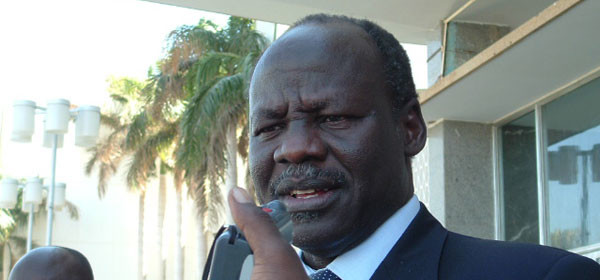Opposition leader Lam Akol revealed in a weekly newspaper in Juba that incidents at Kaka and Kodok in 2008 in the border state of Upper Nile contributed to his decision to defect from the ruling party SPLM the next year. He said that he was offended by local party officials who denied him permission to deliver speeches in those areas.
The politician’s remarks were published by the weekly New Times paper in the form of a letter addressed to the columnist Kuir E Garang.
“In April [2008], my car was shot at near Malakal by unknown assailants resulting in the killing of my bodyguard and the driver. In the same month, I was denied getting into Kodok town by an SPLM Commissioner using the SPLA. After that I was refused to address the public in Kaka and Wadakona by the SPLM Commissioner,” Akol wrote. He added by way of insult that the commissioner was “previously an SAF intelligence sergeant” when he was commanding opposition forces in the area.
Akol’s political activities at that time were under intense scrutiny by other party leaders. He was a member of the SPLM political bureau and parliament, but he had recently been removed from his position as minister of foreign affairs and replaced by Deng Alor. He was also denied the consolation post of minister of cabinet affairs.
This abrupt change in Akol’s political fortunes came shortly after SPLM ministers in Khartoum walked out of the national unity government in October 2007. The “only reason” for the strike, according to Akol, was to remove him from the cabinet. This claim is perhaps exaggerated, but clearly the walkout did give the upper hand to those in the party who wanted uncompromising implementation of the CPA and who perceived Akol as too close to the National Congress Party.
The incidents at Kodok, Kaka and Wadakona added to Akol’s sense of injury: “I raised complaints to Salva Kiir on these incidences [sic] to no avail. I still keep copies of these letters of complaint. Can you imagine junior Party members preventing a member of the Political Bureau from interacting with the public without orders from above?”
“Then came the SPLM convention in 2008, and my name was left out of the members Salva Kiir appointed to the Political Bureau… I and others with me refused to accept humiliation. Such was the birth of SPLM-DC in June 2009,” he wrote.
Lam Akol is a member of the Shilluk tribe, the third largest ethnic group in South Sudan. He was one three members of the SPLA high command who defected in 1991 in an attempt to overthrow John Garang de Mabior. His attempt failed and instead he became commander of a breakaway faction and later held a government post in Khartoum. He returned to SPLM before 2005 and remained with the party until 2009.
Tensions between Akol and President Salva Kiir reduced last year when the two held a public reconciliation ceremony in Juba. But the opposition figure continues to live outside of the country. He told Sudan Radio Service last August that he remains in Khartoum because he owns a house there and still fears for his safety.




